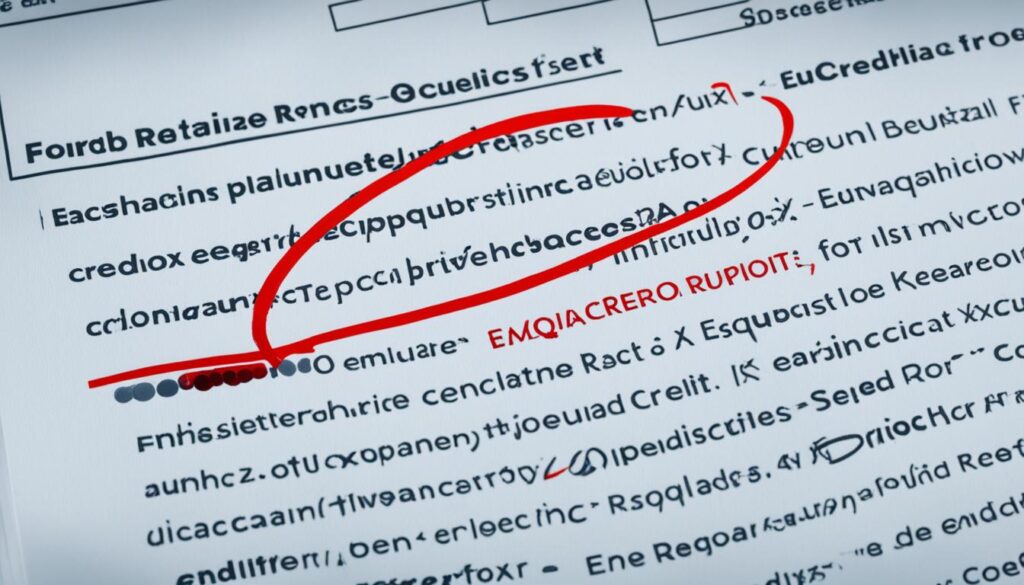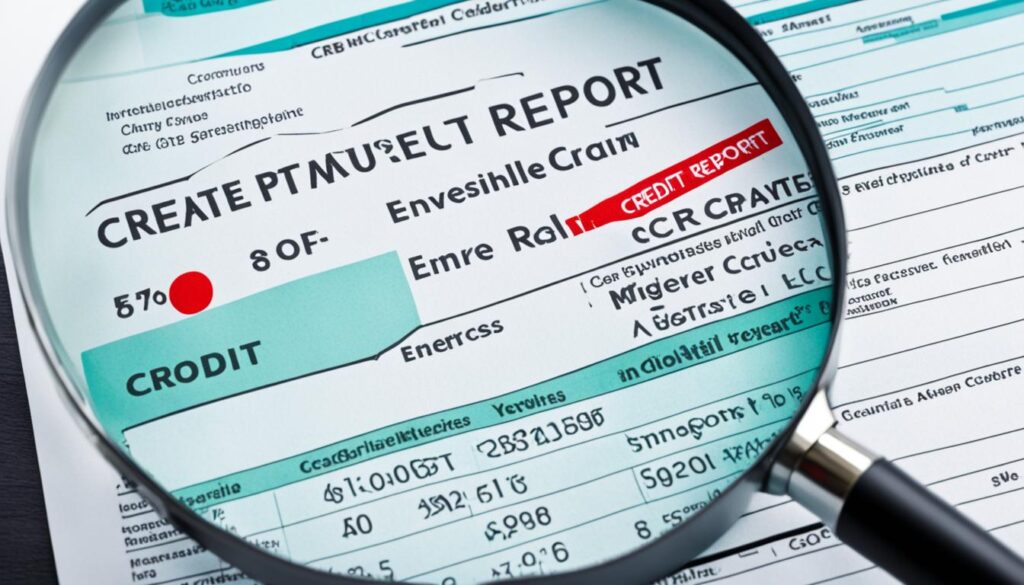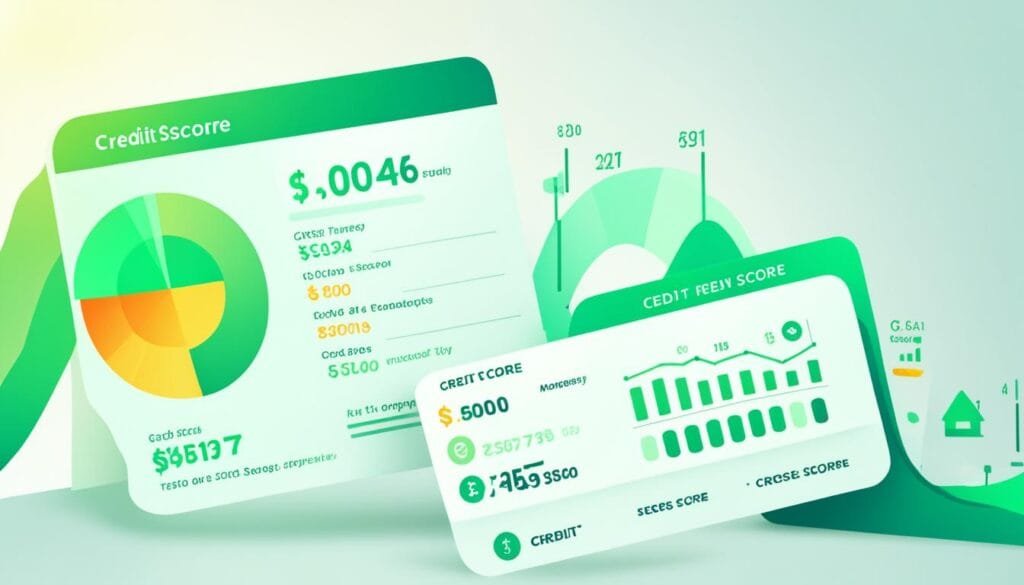Your credit report is like a financial passport that can open doors to opportunities. It determines your borrowing power, influences interest rates, and even impacts your ability to rent a home or secure a job. Maintaining the accuracy of your credit report is paramount to ensure a solid financial footing.
Let’s imagine you’re excitedly searching for your dream home. You’ve found the perfect house, and after weeks of anticipation, your loan application is approved. However, the lender informs you that your interest rate is higher than expected due to an error on your credit report. Your heart sinks as you realize the mistake could cost you thousands of dollars over the lifetime of the loan. This is where disputing credit report inaccuracies becomes crucial.
Disputing credit report inaccuracies is the process of alerting the credit reporting agencies to errors in your credit report and requesting corrections. It provides you with the opportunity to rectify mistakes that can negatively impact your financial well-being. By taking the necessary steps to dispute inaccuracies, you can ensure the accuracy and integrity of your credit report and protect your financial future.
Key Takeaways:
- Disputing credit report inaccuracies is essential to maintain your financial integrity.
- Your credit report plays a significant role in determining your borrowing power, interest rates, and financial opportunities.
- Understanding the dispute process and contacting credit reporting agencies are crucial steps in correcting errors on your credit report.
- Regularly monitoring your credit report and reporting scams contribute to safeguarding your financial well-being.
- Keep thorough records of all communication and documentation throughout the dispute process.
Please note that the image placement is for illustrative purposes only and doesn’t represent the exact positioning in the final article.
The Importance of Credit Report Accuracy
Your credit report plays a crucial role in various aspects of your life, impacting your buying power, job opportunities, housing options, and even insurance rates. It is a reflection of your financial responsibility and reliability. Therefore, maintaining accurate and complete credit reports is of utmost importance.
Credit bureaus compile and sell your credit information to businesses that use it to make informed decisions about lending, credit, insurance, and rental applications. These businesses rely on your credit report accuracy to assess your creditworthiness and determine the terms and opportunities they offer you.
Regularly monitoring your credit report is crucial to promptly identify discrepancies or potential instances of identity theft. By spotting and rectifying errors, you can proactively protect your financial reputation and secure the best possible terms for your future endeavors.
The Impact of Credit Report Accuracy
A credit report with accurate and up-to-date information can open doors to favorable opportunities, such as low-interest loans, competitive insurance rates, and attractive rental agreements. On the other hand, inaccurate information can negatively impact your financial well-being and limit your options.
For example, suppose you are applying for a mortgage to buy your dream home. Lenders heavily rely on your credit report to determine your eligibility and interest rate. If there are errors in your report, it could lead to a higher interest rate or even a loan denial, preventing you from achieving your homeownership goal.
The Importance of Disputing Incorrect Credit Information
If you come across any inaccuracies in your credit report, it is crucial to take immediate action by disputing the incorrect information. Disputing errors allows you to correct your credit report and ensure its accuracy. By doing so, you can protect yourself from unfair consequences and ensure fair treatment from potential lenders, insurers, employers, and landlords.
Disputing incorrect credit information involves notifying the credit bureaus and providing supporting evidence of the inaccuracies. This process helps rectify any mistakes and maintain the integrity of your credit information.
| Steps for Disputing Incorrect Credit Information | Benefits of Disputing |
|---|---|
| 1. Review your credit report thoroughly to identify errors | – Prevent potential negative impact on your financial opportunities |
| 2. Gather documentation to support your dispute | – Correct any inaccuracies in your credit report |
| 3. Notify the credit bureaus in writing about the errors | – Ensure fair treatment from lenders, insurers, employers, and landlords |
| 4. Maintain detailed records of all communication and documentation | – Protect your financial reputation |
By disputing incorrect credit information, you take control of your financial well-being and ensure that your credit report accurately reflects your creditworthiness.
Understanding Credit Report Disputes
If you discover any errors or inaccuracies in your credit report, it is crucial to take swift action to correct them. Both the credit bureau and the business that provided the inaccurate information are responsible for rectifying any mistakes in your report. Disputing credit report errors involves notifying the credit bureau and the business in writing, explaining the inaccuracies, providing supporting evidence, and keeping records of all communication.
When you identify credit report errors, it is important to understand the credit dispute process. By following these steps, you can increase the chances of resolving the issue efficiently:
Step 1: Notify the Credit Bureau
Begin the credit dispute process by sending a written notice to the credit bureau that issued your report. Clearly explain the errors or inaccuracies that you found, providing specific details such as incorrect account balances, late payments, or unauthorized accounts. Supporting evidence, such as billing statements or correspondence, can strengthen your case. Keep copies of all documents.
Step 2: Contact the Business
Simultaneously, communicate with the business or lender that provided the inaccurate information to the credit bureau. Directly notify them in writing about the errors, including any relevant evidence. Keep a record of your correspondence, including dates, times, names of individuals spoken to, and copies of any letters or emails exchanged.
Step 3: Refrain from Delaying Payments
While the dispute is in progress, it is essential to continue making timely payments on your accounts. Failure to pay may negatively impact your credit score, and it is important to maintain a positive payment history.
Step 4: Confirm Resolution
Once the credit bureau completes its investigation, it will inform you of the resolution in writing. This includes any changes or corrections made to your credit report. Review the updated report to ensure all inaccuracies have been rectified.
“Ensuring the accuracy of your credit report is key to maintaining your financial integrity. By disputing errors promptly and providing supporting evidence, you can swiftly correct any mistakes and protect your creditworthiness.”
Remember, the credit dispute process can take time, often lasting around 30 to 45 days. It is vital to maintain open communication with both the credit bureau and the business involved. By diligently following the credit dispute process, you can work towards achieving an accurate credit report that reflects your true financial standing.
| Advantages | Disadvantages |
|---|---|
| Correcting inaccuracies and errors | Disruption of normal financial activities during the dispute process |
| Protecting your creditworthiness | Potential delays in resolving disputes |
| Ensuring fair assessment by lenders, insurers, and employers | Potential impact on loan or credit application timelines |
Disputing with Credit Reporting Agencies
To ensure the accuracy of your credit report, it is crucial to engage with the credit reporting agencies directly. This allows you to contest any errors or inaccuracies listed in your report. The three major credit reporting agencies in the United States are Equifax, Experian, and TransUnion. Here’s a brief overview of the dispute process with each agency.
Equifax Dispute Process
To dispute errors with Equifax, you have multiple options available. You can file a dispute online through their website by navigating to the dispute section and filling out the necessary details. Alternatively, you can submit your dispute through mail or phone. Make sure to gather and include relevant supporting documents and clearly outline the inaccuracies in your report.
Experian Dispute Process
To initiate a dispute with Experian, you can file it online, through mail, or by phone. Utilize their online dispute center to submit your claim electronically. If you choose to mail your dispute, ensure you include a written letter along with supporting evidence. Experian’s contact information for dispute resolution can be found on their official website.
TransUnion Dispute Process
To dispute inaccuracies in your TransUnion credit report, you can submit a dispute online, by mail, or by phone. Access their online dispute form and provide the requested information to initiate the process electronically. If you prefer to send your dispute via mail, include a written letter along with the necessary supporting documentation. TransUnion’s contact information for disputes can be found on their website.

Comparing Credit Reporting Agency Dispute Processes
| Agency | Dispute Process | Contact Information |
|---|---|---|
| Equifax | Online, Mail, or Phone | Available on the Equifax website |
| Experian | Online, Mail, or Phone | Found on the Experian website |
| TransUnion | Online, Mail, or Phone | Accessible on the TransUnion website |
When disputing with credit reporting agencies, remember to keep a record of all communication and documentation. This ensures that you have evidence to support your claim, should any issues arise during the dispute process. Taking proactive steps to correct errors in your credit report can have a significant impact on your overall financial well-being.
The Investigation and Resolution Process
After you have lodged your dispute with the credit bureau, the investigation process begins. The credit bureau is required to investigate the inaccuracies you have reported within 30 days. During this time, they will reach out to the business that supplied the disputed information and gather evidence to evaluate the validity of your claim.
It is important to note that the credit bureau has a legal obligation to respond to your dispute in writing, providing you with the results of their investigation. Additionally, if the dispute leads to a correction in your credit report, the credit bureau must also furnish you with a free copy of your updated credit report.

Should the credit bureau determine that your dispute is valid and make necessary corrections to your credit report, they are required to inform any entities that received your credit report in the past six months of the updates made.
Disputing with Data Furnishers
In addition to disputing with the credit bureau, you can directly contact the business or data furnisher involved in reporting inaccurate credit information. This step allows you to address the issue at its source and ensure a comprehensive investigation. When you reach out to the data furnisher, they are legally obligated to investigate your dispute and provide a response to the credit bureau within a specified timeframe. By engaging with the data furnisher, you increase your chances of rectifying the inaccurate information on your credit report.
Effective communication with both the credit bureau and the data furnisher is essential during the dispute process. Here are some key steps to remember when contacting data furnishers:
- Collect evidence: Gather any supporting documents or evidence that validate your claim of inaccuracies in your credit report. This includes payment receipts, correspondence, or any other relevant records.
- Compose a formal dispute letter: Write a clear and concise letter that explains the discrepancies in your credit report and includes the supporting evidence you have gathered. Address the letter to the appropriate contact person at the data furnisher.
- Send the dispute letter via certified mail: To ensure a record of delivery, send your dispute letter through certified mail. This will provide proof that the data furnisher received your documentation.
- Maintain a record of communication: Keep a detailed log of all interactions with the data furnisher, including the dates, names of individuals spoken to, and summaries of the discussions. This will help you track the progress of the dispute.
By following these steps, you can effectively dispute credit report inaccuracies with data furnishers, increasing the likelihood of a successful resolution. Remember to remain persistent and keep thorough records throughout the process. Your dedication to correcting the inaccuracies on your credit report demonstrates your commitment to maintaining accurate credit information.
Comparison of Disputing with Credit Bureau vs. Data Furnishers
| Credit Bureau | Data Furnishers | |
|---|---|---|
| Responsibility | The credit bureau is responsible for investigating and resolving credit report inaccuracies. | Data furnishers are responsible for investigating and reporting the results of the dispute to the credit bureau. |
| Contact Method | Dispute the inaccuracies through written letters, online platforms, or phone calls. | Contact the data furnisher directly through formal dispute letters. |
| Supporting Evidence | Include supporting evidence in the dispute letter sent to the credit bureau. | Include supporting evidence in the dispute letter sent to the data furnisher. |
| Communication Record | Maintain a record of all communication with the credit bureau. | Maintain a record of all communication with the data furnisher. |
| Resolution | The credit bureau provides a written response and updates your credit report if the dispute is successful. | The data furnisher investigates the dispute and notifies all three nationwide credit bureaus of any necessary corrections. |
Contacting data furnishers is a crucial step in disputing credit report inaccuracies. By maintaining open communication and providing supporting evidence, you increase the chances of resolving the inaccuracies successfully.
Monitoring Credit Reports and Reporting Scams
To safeguard your financial wellbeing, it is essential to regularly monitor your credit reports. Reviewing your reports helps you identify errors, spot identity theft attempts, and ensure the accuracy of your credit information.
When monitoring your credit reports, pay close attention to any unusual or suspicious activity, such as unfamiliar accounts or inquiries. These could be signs of potential identity theft or fraud.
If you come across any scams, fraudulent activities, or unethical business practices, report them promptly to the appropriate authorities. One such entity is the Federal Trade Commission (FTC), which is responsible for investigating and taking action against fraudulent practices.
Reporting scams and fraudulent activities not only protects yourself but also helps prevent others from falling victim to similar schemes. By speaking up, you play a crucial role in maintaining the integrity of the financial system and safeguarding fellow consumers.
How to Report Scams and Fraudulent Activities:
- Document any evidence or details related to the scam or fraudulent activity.
- Contact the appropriate authorities, such as the FTC, and provide them with the necessary information.
- File a complaint with your local law enforcement agency.
- Inform your financial institution about the incident and any potential impact on your accounts.
- Stay vigilant and monitor your credit reports regularly to ensure no further unauthorized activities occur.
Regular credit report monitoring and reporting scams are essential steps to protect yourself from financial losses and maintain the integrity of your credit information. By staying proactive and alert, you can identify potential issues early on and take appropriate action to rectify them.
How Can I Effectively Navigate the Process of Disputing Credit Report Inaccuracies?
When facing errors on your credit report, understanding the credit report dispute process is essential. Begin by obtaining a copy of your credit report, identifying inaccuracies, and gathering supporting documents. Next, submit a formal dispute to the credit bureau, providing clear explanations and evidence. Follow up regularly to ensure resolution.
Conclusion
Disputing credit report inaccuracies is an essential step in maintaining your financial integrity. By understanding the dispute process, contacting credit reporting agencies and data furnishers, and monitoring your credit reports, you can correct errors and protect yourself against identity theft.
Remember to keep thorough records of all communication and documentation throughout the dispute process. By taking proactive measures, you can ensure the accuracy of your credit information and secure favorable financial opportunities.
Don’t let inaccuracies on your credit report hold you back. Take charge of your financial health today and dispute any errors that may be dragging down your credit. With persistence and attention to detail, you can restore the accuracy of your credit information and pave the way for a brighter financial future.
FAQ
What is the importance of credit report accuracy?
Credit report accuracy is crucial as it impacts your buying power, job opportunities, housing options, and insurance rates. Credit bureaus sell your credit information to businesses that use it to make informed decisions about lending, credit, insurance, and rental applications. Maintaining accurate and complete credit reports is essential to secure favorable terms and opportunities.
How do I dispute credit report errors?
To dispute credit report errors, you need to contact each credit bureau separately. This involves submitting a written dispute letter along with supporting documents that highlight the inaccuracies. The credit bureaus have specific addresses for disputes, and you can send your letter through certified mail to ensure a record of delivery. It is also possible to file disputes online or via phone.
What is the process of credit bureau investigation?
After receiving your dispute, the credit bureau has 30 days to investigate the inaccuracies. They will communicate with the business that provided the disputed information and gather evidence to assess the validity of the claim. Upon completing the investigation, the credit bureau must provide you with the results in writing, along with a free copy of your updated credit report. If the dispute results in a correction, the credit bureau must notify anyone who received your report in the past six months.
How can I dispute credit report errors with data furnishers?
In addition to disputing with the credit bureau, you can also contact the business or data furnisher directly. Businesses that provide information to credit bureaus must investigate your dispute and report the results back to the credit bureau. If the furnisher finds the information to be inaccurate, they must notify all three nationwide credit bureaus for correction. It is important to maintain open communication with both the credit bureau and the furnisher during the dispute process to ensure a comprehensive investigation.
Why is it important to monitor credit reports and report scams?
Regularly monitoring your credit reports helps you identify errors, spot identity theft attempts, and ensure the accuracy of your credit information. Additionally, reporting scams, fraudulent activities, or unethical business practices to authorities such as the Federal Trade Commission (FTC) helps protect yourself and maintains the integrity of your credit information.

